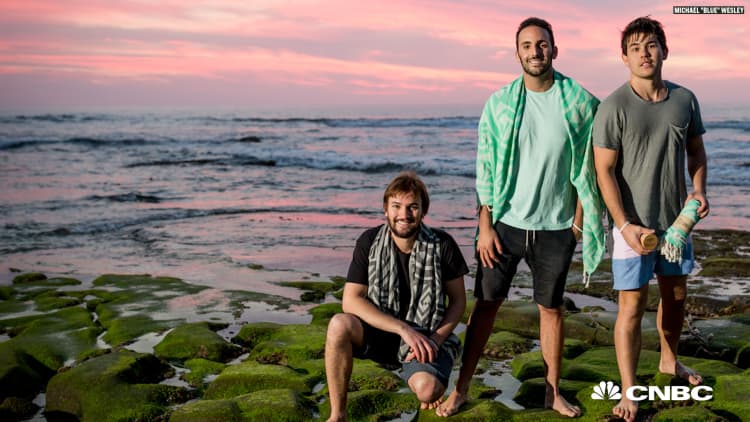As sisters Jenae and Jasmine Harris watched their subscription boxes full of disappointing, unused and expensive cosmetics pile up, they realized something: All the mainstream beauty box services they'd been ordering were aimed at white women, not African Americans like themselves, or other women of color.
"I was tired of receiving boxes every month that didn't have a majority of products I could use," Jasmine Harris, tells CNBC Make It.
"If it was makeup, the coloring would be off," Jasmine explains to MPR News. "Lipstick, the shades would be inappropriate for my skin tone, or [the] hair products were not made for kinkier textured hair, like mine."
Frustrated, the sisters decided to do something about it. Last fall, they launched HuesBox, a subscription service "by people of color, for people of color — not just African-Americans," their mom, Robin Harris, who is also involved with the company, tells MPR News.
The Harrises are tapping a huge but under-served market. According to Women's Wear Daily, black women alone spend $7.5 billion a year on beauty products. They spend 80% more on cosmetics and two times as much money on skin care as general consumers.
"We were trying to think less about what was already out there, and more about what we would want," Jasmine tells CNBC Make It.
Subscribers fill out a profile and HuesBox customizes the monthly product haul. But HuesBox doesn't send customers big brand products — instead the Harris sisters hunt down the best finds from small businesses run by people of color.
"What you'll see in our box you won't see in a store," Robin tells MPR News.
Boxes, which cost $15 each, include about four to six items, such as an oil, a henna tattoo and a cosmetic, plus a non-beauty item, like tea, along with a card that describes that products' cultural origins. For instance, subscribers received a tool for Gua Sha, a traditional East Asian practice often used to relieve pain and stimulate blood flow.
The Harrises are also committed to supporting the small business owners they work with, many of whom may be operating out of their homes or on a very small scale. They do so by paying the vendors for their product samples, Janae says. Many subscription services don't.
"Most boxes are on a model that is similar to ours, which is where brands work with them as a part of a bigger marketing strategy," says Delali Kpodzo, co-founder of Onyx, a beauty subscription service for black women. "It's a great way to introduce their products to an audience that is eager to work for them."
Indeed, the reach, data and access to consumer feedback provides a marketing value for brands, says Birchbox spokesperson Jenna Martin Hilzenrath to CNBC Make It. Birchbox did not compensate for samples when it first started in 2010, but now that it requires larger volumes of product, agreements can vary, says Hilzenrath.
Jasmine, a professor, and Jenae, a lawyer, initially fronted payments to vendors with their own money, but now use revenue from sales.
"As small businesses we're not in a position to have the resources to partner with the major brands," says vendor Jen Rightler-Mahone of J'Elaine Cosmetics, which is based in Florida. "HuesBox makes it very easy because they're willing to compensate you for your samples."
But beauty isn't HuesBox's sole mission, say the co-founders. Core to the company is creating conversation around the products and self-care. The brand's media is a space for discussions about wellness; Jasmine recently blogged about her experience with mental illness. Subscribers can review the products on the site, and the Harrises also post podcasts and videos. It's something the sisters felt they missed growing up in a mostly-white area.
"How useful it would have been for us growing up in suburban Minnesota to have access to this kind of discourse, where people are sharing what experiences they've had with self-care," Jasmine says.
So far, the Harris sisters have hand-packed and shipped more than 2,100 boxes from their homes in Minneapolis (Jenae) and Philadelphia (Jasmine) to 49 U.S. states (all except Alaska), plus Canada. They've also extended their service to products for men, and are launching a pop-up shop hosted by American artist Traci Braxton at the Video Music Awards in Los Angeles this month. HuesBox has brought in $20,000 in revenue so far.
The Harrises say they've been approached by a few angel investors and one firm, but at the moment, they are still self-funded.
For now, that means "we're running a little ragged at the time," says Jenae. But "We'd love for this one day to be all we're doing."
Don't miss: How 3 guys went from call center cubicles to 'Shark Tank' and millions of dollars in sales in 3 years


